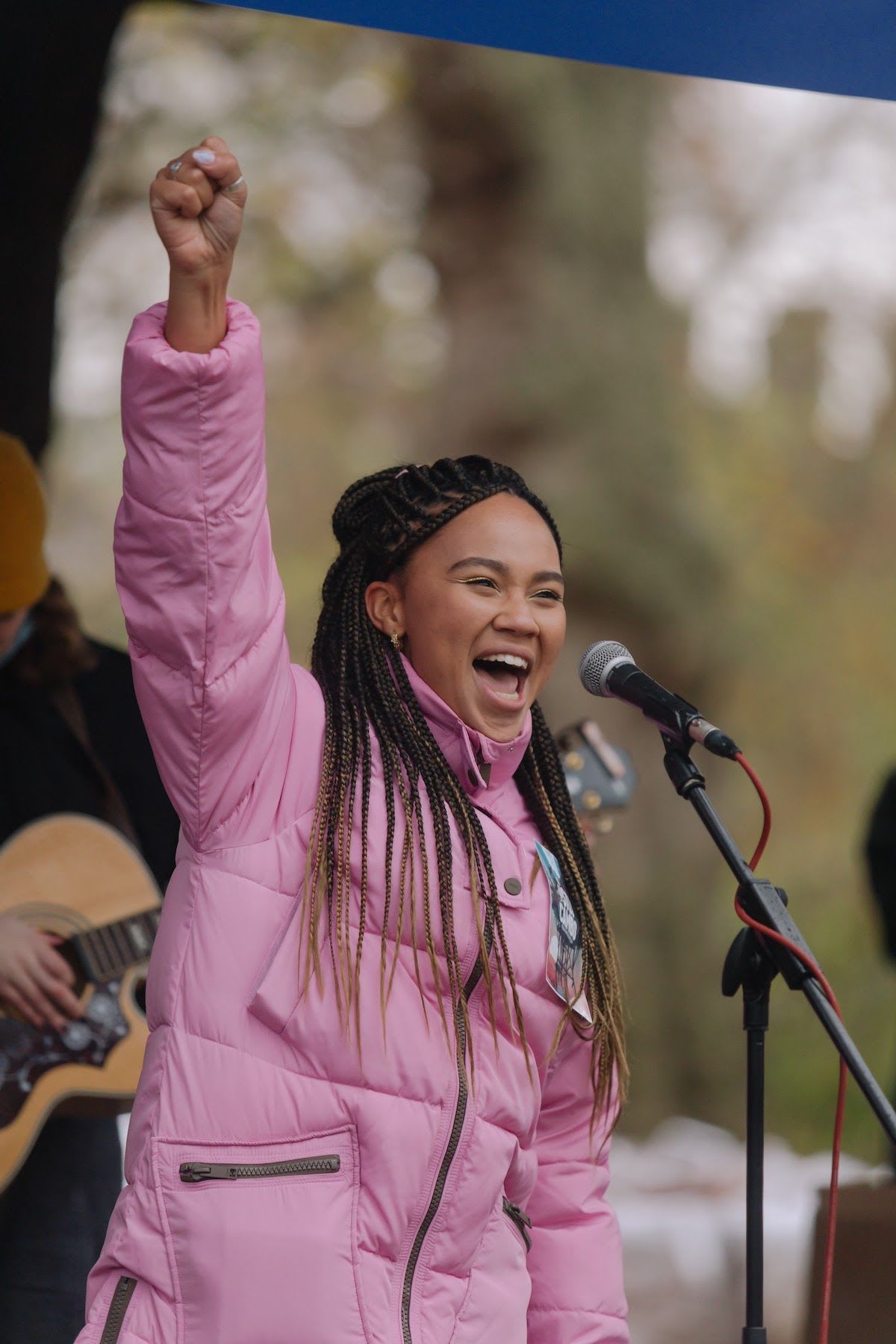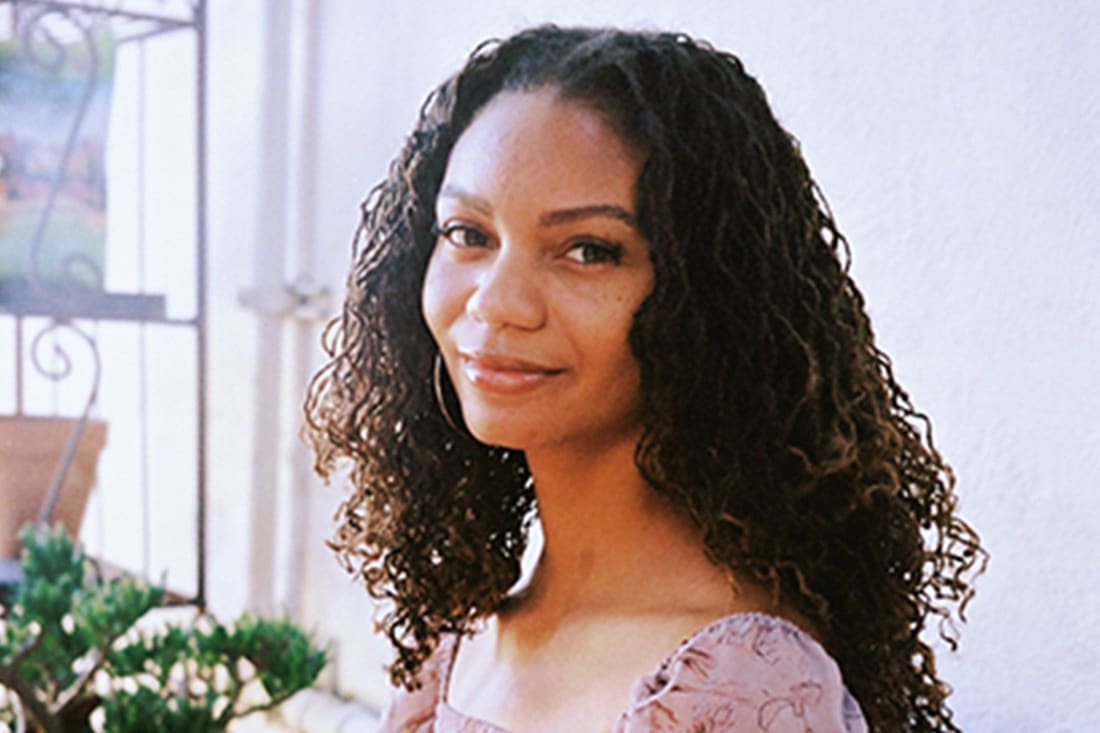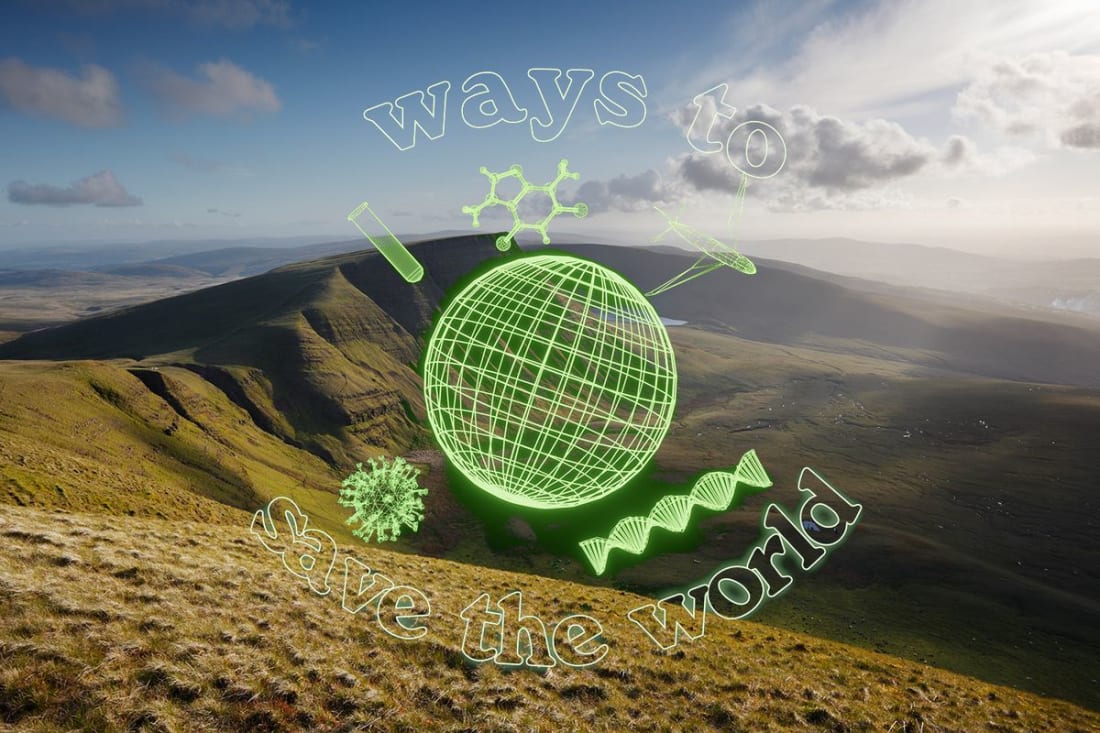For Mikaela Loach, there's nothing more enticing than building a better world
The environmental activist discusses social media celebrity, political awakening and the galvanising message of her debut book It's Not That Radical
The environmental activist discusses social media celebrity, political awakening and the galvanising message of her debut book It's Not That Radical
Social media activists are often portrayed as palatable influencer-lites, succumbing to buzzwords and facile pleasantries rather than pushing forward for real change. But what if it isn't all brand deals and towing the corporate-friendly line? There are plenty of activists and organisers who see digital communications as one of many tools in their arsenal and whose message remains uncompromising.
One such figure is Mikaela Loach, the 25-year-old trainee doctor who you may well recognise for her 160k-strong Instagram following, bright pink outfits and transformative politics. Born in Jamaica and moving to the UK some three years later, she recalls becoming political during the refugee crisis, which began in 2015. It was a point where she saw the conditions of displaced people first hand while volunteering in Calais and grappled with the arbitrary privileges granted to individuals on the basis of having the "right" birth country, parenthood or documents - denominators used to create a tacit, sliding scale of human worth in the eyes of Western nations.
Now, she's committed to a brand of intersectional environmentalism which recognises that the fundamental goals of the climate movement - that everyone is entitled to a liveable future - intersect with other social justice themes across workers' rights, racial justice, abolishing borders and gender equality. In recent years, she's worked on the #StopCambo campaign, which successfully led to Shell dropping out of a proposed oil field near the Shetland Isles, and taken the UK government to court over public payments made to North Sea oil and gas companies.
Following years of organising in person and online, Loach has now embarked on a new endeavour; releasing her first book, It's Not That Radical: Climate Action to Transform Our World. The result is accessible, practical and - much like Loach herself - committed to a bigger political picture enabled collective action. To mark Earth Day, woo caught up with Loach to discuss the book's not-so radical aims, the importance of situating joy within the climate movement, and the role that community plays in her work.

How are you feeling about your first book, It's Not That Radical, being out in the world?
I'm very excited about it all but I'm hitting the crash of having to have had a lot of energy after a year and a half of writing and then publicising everything. But it's been amazing to see such a great response from people.
Do you think there's an expectation for you to have a lot of energy all the time?
For sure. I'm expected to be a hope machine. Sometimes the human side of myself is not acknowledged often enough. Because the nature of my work is around wanting to build a better world, people then see that as an opportunity to take all of my time and energy. I've had to learn that if I want to be able to do this work for a long time, I really need to protect my energy and my peace as much as I can. Which is what I'm trying to do more of - I'm not great at it, but I'm trying.
Besides boundary-setting, how do you take care of yourself and avoid activist burnout?
We talk a lot about self care, but I think that the real way that [to avoid activist burnout] is community and caring for each other. Individualised self care is is very capitalist framework of; "How can we profit off of the fact that people are made unwell by capitalism?" People are made unwell because we live in a system that doesn't see human people as valuable and so we just say that we should buy something to make ourselves feel better. That's not real empowerment or support or care. In buying that thing, it's very possible that other people have been harmed by [if it wasn't ethically or sustainably produced]. I think that for me, having great relationships with people in my community, where I live and the people I organise with, or with friends, is the way that I have managed to not burn out as much as I used to.
Let's circle back to the book - could you talk us through the choice of title?
The title references a kind of duality. In the mainstream media, we're told over and over again that a world where everyone is housed and has safe water and food and can live a life in dignity is a ridiculous extreme, a radical demand or just impossible. We get told that the kind of people who are advocating for that are extreme, ridiculous and outrageous.
The point of the book was to reframe what is really ridiculous and outrageous. Something which is outrageous is the fact that billions of pounds are given to fossil fuel industries in public subsidies that come from public money which could be used for hospitals or schools. That there are so many homes laying empty in the world while there are so many people who are forced to be unhoused. That we have a very small percentage of people who own most of the wealth and that the majority of people live very insecure lives. Those things are not necessity. These systems that have created a very unequal world have been made by people, so they can be unmade by people.
We have to go to the roots of these issues - of white supremacy, of capitalism, of whatever has created inequality - in order to tackle it. Therefore, we have to be radical in the sense of the word that Angela Davis uses; that of grasping at the root.
You're clearly very interested in political theory. Why did you want to approach this book as more of an accessible and practical project?
There just aren't enough books out there that are accessible and practical. I think that there can be too much preaching to the choir; things directed at people who already care or things aimed at making them feel better about already knowing these things. If what we're actually trying to do is transform the world around us and make a better world, then we have to create entry points for people. I think that's what the book does. It's a great entry point for people but if you are already familiar with some of these concepts, it also still grows on them.
I didn't compromise on what we're demanding when trying to be accessible. Creating resources that people can actually understand and which they can do something with, that's so, so important. More so than just reading a book and feeling a bit smarter. Otherwise, I wouldn't have written a book. My role is as an organiser, and I have to sit with myself and be like; "Would it be more useful for me to spend a year and a half of my life writing this book? Or would it be more useful for me to spend that same amount of time in the organising spaces that I'm in and using that energy there?"
Do you have an intended reader for It's Not That Radical?
The intended reader is someone who cares about about the fact that we're in a climate crisis, which is most people. Studies have shown that 74% of the UK public are deeply worried about the climate crisis. But the point is that it's a very hopeful book. I'm aiming towards the people who care but have been made to feel like there's nothing they can do about it or who are overwhelmed by it. The hope is that this book can galvanise feelings into action.
But it's also for people who maybe don't think they care about the climate crisis, but who care about other issues like racial injustice or workers' rights. It's a book about liberation and building a better world: it's about so much more than just climate. This is a book that will hopefully knit many issues together and show that there is so much we can actually do to change things.
I want to spread the message that change is not a passive thing. Things won't just get better; people have to make them better. But the book isn't a how-to guide, it's not ten steps and some tick boxes. It's more about asking how we can change our entire perspective. How can we ensure that we are compelled to act, because there's nothing that's more attractive than building this better world?
Hearing you speak, there's this emphasis on hope and the generative nature of that feeling. I'm presuming that you're influenced by pleasure activism?
For sure. I read Pleasure Activism whilst writing the book and I referenced lots of different adrienne maree brown works, especially We Will Not Cancel Us which is a little pamphlet but it's so, so good. We need to be thinking about to make movements we want to move towards. How do you make the action to get to the better future the most pleasurable and exciting thing that we could possibly do?
In terms of your own journey, what was your political awakening?
It was when I saw the picture of Alan Kurdi, who was only three years old when a picture of his body, washed up on a beach on an island in Greece, was published in many of the UK newspapers. His family attempted to change their circumstances, like any family would, especially in the face of war. As I write about in the start of the book, I was three and a half when I moved from Jamaica to the UK because my family wanted a better life. The only reason I was able to do that safely and easily was because of the privilege of having a British father, which is complete luck really.
From there, I went to Calais to volunteer on the border and saw how violently the French police treated people who were displaced. Then hearing people's stories and working with people who are really just ordinary people trying to change things. That made me realise that in the face of despair and growing fascism, we don't have to just lie down and not do anything. We don't have to just expect that someone out there is going to come and save us. Actually, the people who cause heroic or miraculous change are very ordinary people who do very ordinary, fairly mundane actions that come together to create a bigger change. Seeing those experiences had a really big impact on me.

Given that you consider it be ordinary people who create change, how does it sit with you being such a public face within the climate movement?
All this happened by accident and it's something that I still feel uncomfortable with. But I recognise that I play a role in this movement, I'm very aware that we live in a world that is very individualised and where there is an obsession with individual people. We can sometimes leverage that for better goals, it can be a vehicle for bringing in new people who wouldn't have come otherwise. I often joke that people might follow me because they see me wearing a nice pink outfit but then they end up learning about climate justice.
I try to use existing tools to create change but I also really want to try and disrupt and challenge the idea of heroism as much as possible. It just disempowers us, I don't want anyone to see what I'm doing and think; "Oh, she's got it sorted. I'm good." The world of celebrity activism is weird. Like deeply weird. But there are so many people who have been leaders in movements who have carried it with grace. And as much as I do worry that I'm playing into a lot of individualism, I think my absence would be worse.
If it helps at all, I'd see you as fitting into public intellectual role. We've said that they're all gone, there are no more public intellectuals, but there's actually quite a few.
Emma Dabiri is definitely one.
And Mady Harris Williams, and Shon Faye! But because the information or discourse is partially spread on social media, it isn't seen as being as serious. But it is!
That was nice to hear. Sometimes I can get put into the box of being an influencer. I've had to sit with myself as to why I got frustrated with that and and whether some of my frustrations with it were coming from my own my internalised misogyny around influencer culture. But I do think that's also why I'm grateful that there is also a book and I have downloaded my brain into something that maybe will help people to be able to see me beyond social media.
But I mean, if you looked at my TikTok you'd think that I was an unhinged person. I'm using all these trends, all these sounds to try to get my stuff out there and to get young people to read a book about anti-capitalism. I'm trying not to silo myself off, the world is changing every day and I think we need to change with it.
I mean, social media really is just about strategic communication. But anyway, as a final question, what gives you hope?
Ah, always a great question to end on...
Let's flip it, then. What gets you up in the morning?
What gets me up in the morning is the fact that changes in the past have come from people deciding to look at really difficult odds and refuse to accept them, to challenge them and to believe that we can do so much more. If my ancestors who were enslaved in Jamaica could, against much greater odds than I face currently, could wake up every day and still believe that it was worth having children and that it was worth believing in a better future then I have no choice but to do that. It's that kind of belief, that kind of legacy that pulls me forward.
It's also this vision of a future that I really know in my soul is so possible, this future where we all live in dignity. And the awareness that this is not just going to come from nowhere. It's going to have to be fought for by all of us and that fight will look very different depending on our skills and our circumstances and whoever we are.
It’s Not That Radical: Climate Action to Transform Our World by Mikaela Loach is out now.



